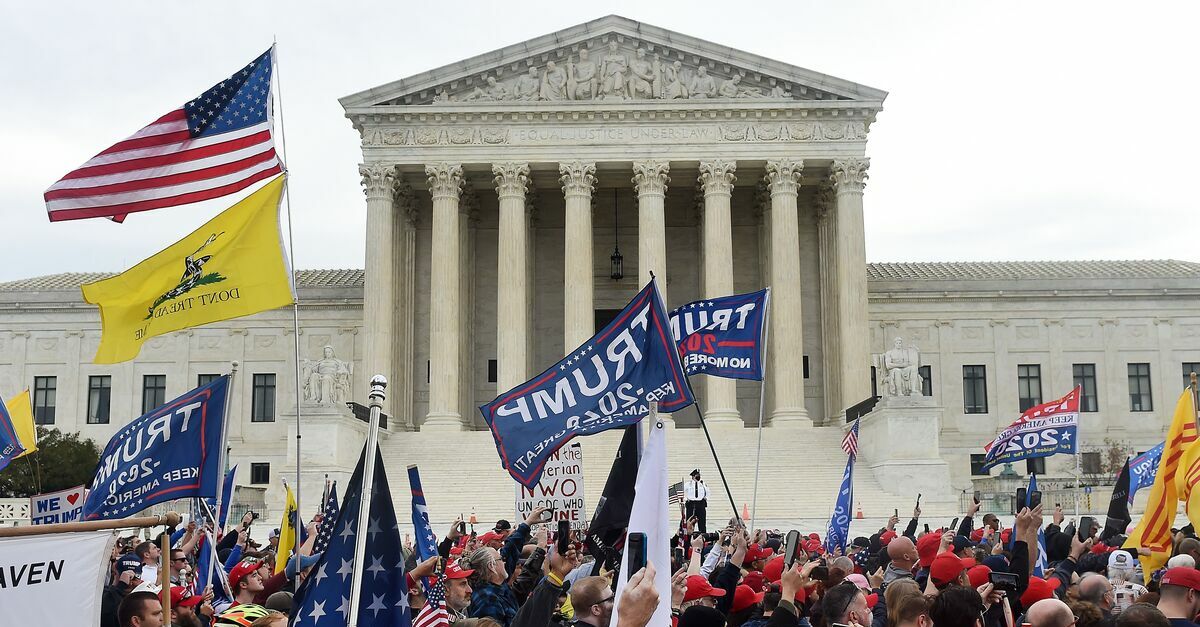
Supporters of US President Donald Trump participate in the Million MAGA March to protest the outcome of the 2020 presidential election, in front of the US Supreme Court on December 12, 2020 in Washington, DC.
“The judgment is vacated, and the case is remanded to the United States Court of Appeals for the Second Circuit with instructions to dismiss the case as moot. See United States v. Munsingwear, Inc., 340 U. S. 36 (1950).”
United States v. Munsingwear, Inc. is a 1950 case that mandates the proper procedure for the Court to dispose of a civil case that has become moot. Accordingly, SCOTUS reversed the decision below, then sent the case back to the Second Circuit, with a direction that the case be dismissed.
In response to the Court’s dismissal, the primary plaintiff in one of the cases, Citizens for Responsibility and Ethics in Washington, released the following statement of its Executive Director Noah Bookbinder:
CREW sued Donald Trump on his first day in the Oval Office for systematic violations of the Emoluments Clauses of the Constitution. We were honored to work in that case with courageous competitors of Trump’s businesses who joined the lawsuit, in a subsequent case with the bold attorneys general of Maryland and the District of Columbia, and with an incredible team of lawyers to pursue these cases. These two emoluments cases continued to move forward successfully, including wins in two federal appeals courts, through four years of the Trump presidency, despite advancing novel legal theories and having the weight of a presidential administration arrayed against them. This important litigation made the American people aware for four years of the pervasive corruption that came from a president maintaining a global business and taking benefits and payments from foreign and domestic governments. Only Trump losing the presidency and leaving office ended these corrupt constitutional violations stopped these groundbreaking lawsuits.
Some experts have pointed to a potentially repetitive problem: litigation always takes time. As a result, legal challenges to emoluments violations will predictably become moot before any president could be held accountable.
UC Irvine law professor Rick Hasen characterized the emoluments ruling as a reward for running out the clock:
Others have criticized the ruling for eliminating a legal basis for demanding Trump return any ill-gotten gains.
Even some of Trump’s harshest critics, however, have agreed that the dismissal for mootness was the right legal outcome.
University of Iowa law professor Andy Grewal weighed in via Twitter on the immediate impact of the ruling:
Law&Crime spoke with Professor Grewal on Monday. He predicted that the Court’s decision may render the Emoluments Clause impotent for regulating future presidents as well:
The Court’s action is unsurprising, given that Trump has left office. But by vacating the decisions below, the Court has ensured that complex jurisdictional questions will have to be litigated all over again, should a similar challenge arise against a future President. It thus seems doubtful that Emoluments Clause litigation will play an important part in regulating the presidency.
The dismissal of Emoluments Clause litigation against Trump provides an interesting parallel to post-presidency impeachment. Many who oppose impeachment argue that holding Senate trial for a president whose term has ended is an unnecessary exercise that will prove harmful and divisive to the country. Still others say the Senate has no jurisdiction to put a former president on trial.
[image via Olivier Douliery /AFP via Getty Images]